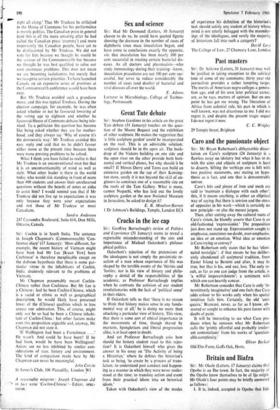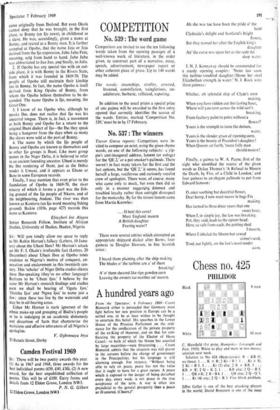Britain and Biafra
Sir: Mr Okole (Letters,-17 January) claims that Opobo is an Ibo town. In fact, the majority of the Opobo know themselves to be of Ijo origin. Mr Okole's four points may be briefly answered as follows: 1. It is, indeed, accepted in Opobo that. Jaja
came originally from Iboland. But even Okole cannot deny that he was brought, in the first place, to Bonny (an Ijo town), in childhood as a slave. He was, accordingly, given a name at Bonny, and reared as a Bonny man. It is further accepted at Opobo, that the name Jojo or Jaja derived from the Ijo expression, Jubo Jubo Fern, meaning, sold from hand to hand. Jubo Jubo was abbreviated to Juo Juo, and finally, to JoJo.
2. If Opobo has any special ties with an out- side place, it is with Bonny in the Rivers State, from which it was founded in 1869-70. The people of Opobo still maintain their kinship ties in Bonny. In fact, the name Opobo is itself derived from King Opubo of Bonny, from whom the Opobo believe themselves to be de- scended. The name Opubo is Ijo, meaning, the Great One.
3. I know of no Opobo who, although he speaks Ibo, does not realise that Ijo was his ancestral tongue. There is, in fact, a movement at both Bonny and Opobo for a return to the original lbani dialect of Ijo—the Ibo they speak being a hangover from the days when so many Ibo slaves were sold at the port of Bonny.
4. The name by which the Ijo people of Bonny and Opobo are known to themselves and to other Ijo groups is Ibani. Like most group names in the Niger Delta, it is believed to refer to an ancient founding ancestor. Ubani is merely the Ibo rendering of Ibani, just as the Ibibio render it Umani, and it appears as Ebane or Bane in some European records.
Finally, I may mention that even prior to the foundation of Opobo in 1869-70, the river estuary of which it forms a part was the fish- ing ground of the Ijo people of Nkoro, and of the neighbouring Andoni. The river was then known as Kontoru (an Ijo word meaning fishing ground). Baikie (1856, page 427) records this name as Kantoro.
Ebiegberi Joe Alagoa Senior Research Fellow, Institute of African Studies, University of Ibadan, Ibadan, Nigeria







































 Previous page
Previous page